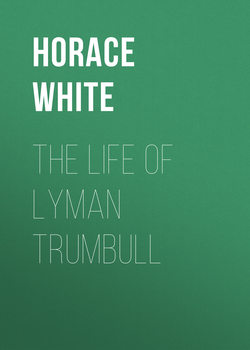The Life of Lyman Trumbull

Реклама. ООО «ЛитРес», ИНН: 7719571260.
Оглавление
Horace White. The Life of Lyman Trumbull
PREFACE
INTRODUCTION
CHAPTER I. ANCESTRY AND EARLY LIFE
CHAPTER II. SLAVERY IN ILLINOIS
CHAPTER III. FIRST ELECTION AS SENATOR
CHAPTER IV. THE KANSAS WAR
CHAPTER V. THE LECOMPTON FIGHT
CHAPTER VI. THE CAMPAIGN OF 1858 AND THE JOHN BROWN RAID
CHAPTER VII. THE ELECTION OF LINCOLN—SECESSION
CHAPTER VIII. CABINET-MAKING—THE DEATH OF DOUGLAS
CHAPTER IX. FORT SUMTER
CHAPTER X. BULL RUN—THE CONFISCATION ACT
CHAPTER XI. THE EXPULSION OF CAMERON
CHAPTER XII. ARBITRARY ARRESTS
CHAPTER XIII. INCIDENTS OF THE YEARS 1863 AND 1864
CHAPTER XIV. THE THIRTEENTH AMENDMENT TO THE CONSTITUTION
CHAPTER XV. RECONSTRUCTION
CHAPTER XVI. ANDREW JOHNSON'S FIRST MESSAGE
CHAPTER XVII. THE FREEDMEN'S BUREAU AND CIVIL RIGHTS BILLS
CHAPTER XVIII. THE FOURTEENTH AMENDMENT
CHAPTER XIX. CROSSING THE RUBICON
CHAPTER XX. IMPEACHMENT
CHAPTER XXI. THE McCARDLE CASE—GRANT'S CABINET—THE FIFTEENTH AMENDMENT
CHAPTER XXII. CAUSES OF DISCONTENT
CHAPTER XXIII. THE LIBERAL REPUBLICANS
CHAPTER XXIV. GRANT'S ADMINISTRATION
CHAPTER XXV. THE CINCINNATI CONVENTION
CHAPTER XXVI. THE GREELEY CAMPAIGN
CHAPTER XXVII. LATER YEARS
CHAPTER XXVIII. CONCLUSION
Отрывок из книги
Events in the year 1854 brought into the field of national politics two members of the bar of southern Illinois who were destined to hold high places in the public councils—Abraham Lincoln and Lyman Trumbull. They were members of opposing parties, Lincoln a Whig, Trumbull a Democrat. Both were supporters of the compromise measures of 1850. These measures had been accepted by the great majority of the people, not as wholly satisfactory, but as preferable to never-ending turmoil on the slavery question. There had been a subsidence of anti-slavery propagandism in the North, following the Free Soil campaign of 1848. Hale and Julian received fewer votes in 1852 than Van Buren and Adams had received in the previous election. Franklin Pierce (Democrat) had been elected President of the United States by so large a majority that the Whig party was practically killed. President Pierce in his first message to Congress had alluded to the quieting of sectional agitation and had said: "That this repose is to suffer no shock during my official term, if I have the power to avert it, those who placed me here may be assured." Doubtless the Civil War would have come, even if Pierce had kept his promise instead of breaking it; for, as Lincoln said a little later: "A house divided against itself cannot stand."
It was not at variance with itself on the slavery question solely. In fact, the North did not take up arms against slavery when the crisis came. A few men foresaw that a war raging around that institution would somehow and sometime give it its death-blow, but at the beginning the Northern soldiers marched with no intention of that kind. They had an eye single to the preservation of the Union. The uprising which followed the firing upon Fort Sumter was a passionate protest against the insult to the national flag. It betokened a fixed purpose to defend what the flag symbolized, and it was only slowly and hesitatingly that the abolition of slavery was admitted as a factor and potent issue in the Northern mind.
.....
What was going on in the South during the thirties and forties of the last century? There were varying shades of opinion and mixed motives and fluctuating political currents. In the first place cotton-growing had been made profitable by the invention of the cotton-gin. This machine for separating the seeds from the fibre of the cotton plant caused an industrial revolution in the world, and its moral consequences were no less sweeping. It changed the slaveholder's point of view of the whole slavery question. The previously prevailing idea that slavery was morally wrong, and an evil to both master and slave, gradually gave way to the belief that it was beneficial to both, that it was an agency of civilization and a means of bringing the blessings of Christianity to the benighted African. This change of sentiment in the South, which became very marked in the early thirties, has been ascribed to the bad language of the abolitionists of the North. People said that the prime cause of the trouble was that Garrison and his followers did not speak easy. They were too vociferous. They used language calculated to make Southerners angry and to stir up slave insurrection. But how could anybody draw the line between different tones of voice and different forms of expression? Thomas Jefferson was not a speak-easy. He said that one hour of slavery was fraught with more misery than ages of that which led us to take up arms against Great Britain. If Garrison ever said anything more calculated to incite slaves to insurrection than that, I cannot recall it. On the other hand, Elijah Lovejoy, at Alton, Illinois, was a speak-easy. He did not use any violent language, but he was put to death by a mob for making preparations to publish a newspaper in which slavery should be discussed in a reasonable manner, if there was such a manner.
In short, there was already an irrepressible conflict in our land, although nobody had yet used those words. There was a fixed opinion in the North that slavery was an evil which ought not to be extended and enlarged; that the same reasons existed for curtailing it as for stopping the African slave trade. There was a growing opinion in the South that such extension was a vital necessity and that the South in contending for it was contending for existence. The prevailing thought in that quarter was that the Southern people were on the defensive, that they were resisting aggression. In this feeling they were sincere and they gave expression to it in very hot temper.
.....